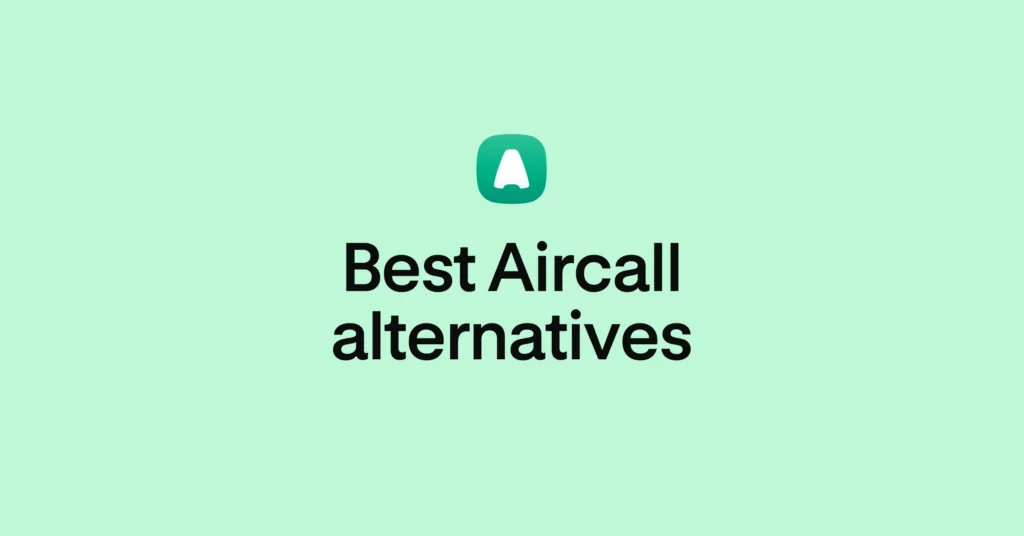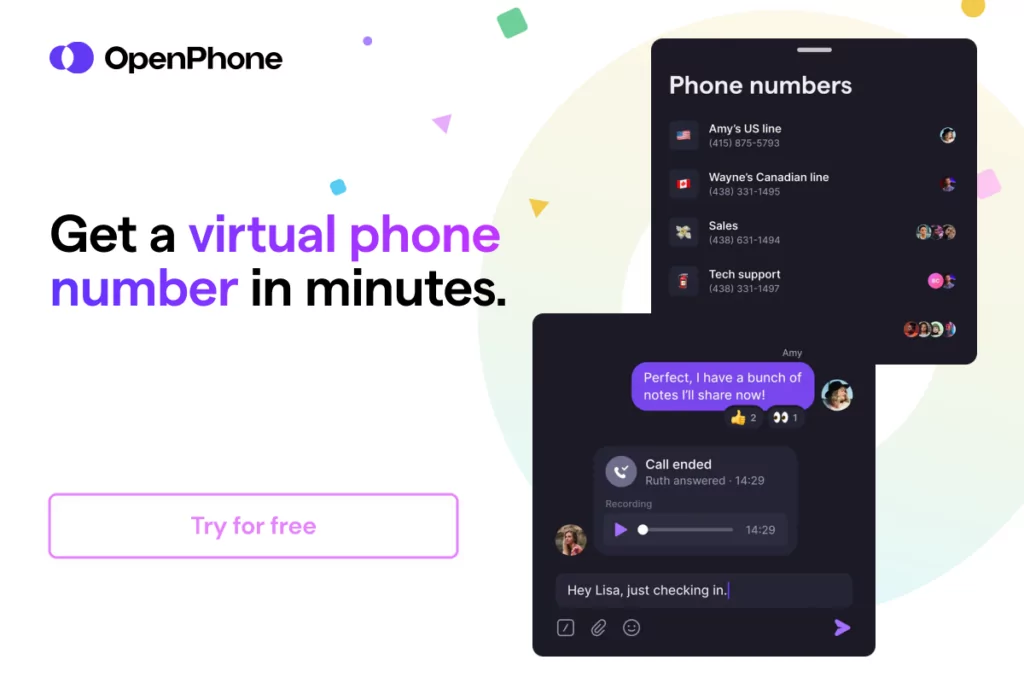Is Aircall the best VoIP phone solution for your business?🤔
It depends.
You’re likely looking for an affordable business phone system that lets your team make and receive calls from wherever they are located — in the office or on the go — from designated business numbers.
While Aircall offers all the basic features needed for a business phone without the high price tag associated with traditional landline phone systems, the platform does have some limitations that Aircall alternatives do not.
Sometimes, it pays to look around. Read on to learn about the pros and cons of Aircall and 11 Aircall alternatives that might suit you even better.
What you should know about Aircall
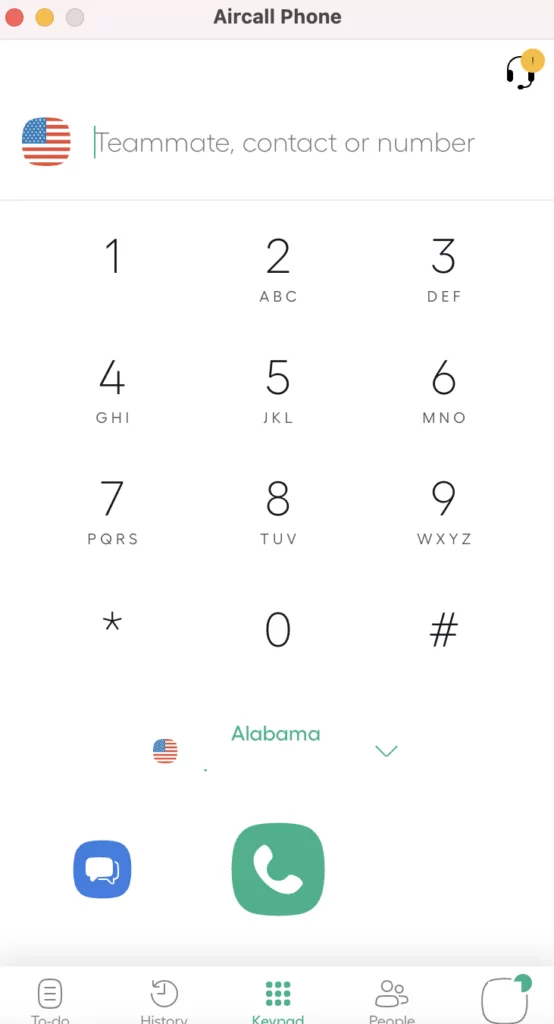
Aircall is a popular choice among cloud-based virtual call centers that want to operate from anywhere. It meshes the benefits of a PBX system with the flexibility of a virtual phone solution. It also integrates with various tools, like Salesforce, Slack, and Zendesk.
Too good to be true? Maybe.
When you compare Aircall to other providers, it’s clear that Aircall lacks some features small businesses need in a business phone solution. On the basic plan, Aircall users can access the following:
- Calls and texts
- API access
- Call recording
- Phone support
- Click-to-dial functionality
You might find that some Aircall alternatives offer more robust features and functionalities — with these major limitations with Aircall in mind.
Aircall adds unnecessary work to your team’s plates
While Aircall is a popular choice for virtual call centers, it lacks key areas that can save your team hours.
Features like voicemail transcription and auto-replies are missing, which makes providing excellent customer service more time-consuming.
Also, don’t expect Aircall to be easy to navigate. Aircall’s user interface of Aircall has a steep learning curve — especially when setting up call flows. Onboarding will likely be time-consuming.
Meanwhile, OpenPhone’s more intuitive platform and internal threads help organize your discussions so your team communicates effectively, whether async or in real-time.
Aircall’s texting features are limited
For the times a quick text will do, Aircall’s basic plan has unlimited domestic inbound text messaging. But if you need to send many text messages, you might want to consider an alternative to Aircall.
The basic plan only allows for a maximum of 4,000 domestic outbound messages per user per month.
Since Aircall doesn’t support MMS messaging, consider shopping around if you need to send and receive photos, videos, and other files. Then there’s always the legwork (finger-work?) of catching up on the texts because texts and calls live in separate sections of Aircall’s app.
Aircall quickly eats up your small business budget

Since Aircall focuses on large enterprises, its pricing structure follows suit. It requires at least three users, so if you’re a one-person band or a duo, Aircall’s call center solution is already off the table.
Still in the game? To unlock unlimited call recording storage and Aircall’s advanced features, you’ll pay $50 per month per user on the annual plan. Along with the hefty pricing, Aircall has some undisclosed fees, such as international call rates and extra charges for using toll-free numbers.
You’ll need to contact Aircall directly for your toll-free number — introducing yet another step to getting started.
Weighing these factors, keep in mind there are alternatives like OpenPhone that offer more competitive pricing and transparent fee structures.
Essentials
- $30 per user per month
- Includes 4,000 SMS messages per user per month, up to one year of storage for call recordings (by request), and a max of three teams per account (three user minimum)
Professional
- $50 per user per month
- Access to Salesforce integration, unlimited call recording storage, and up to six months of advanced analytics (three user minimum)
Custom
- Contact for quote
- Unlocks API developer support, ‘unlimited’ international outbound calls, and prioritized customer support (10 user minimum)
Don’t let Aircall’s high costs drain your budget. Explore affordable alternatives that offer all the necessary features starting at just $15 per month per user, empowering growing businesses to thrive without breaking the bank.
Pros
- Ability to create a cloud-based virtual call center for remote operations
- Benefits of a PBX system with the flexibility of VoIP
- Access to essential features like calls, texts, API access, call recording, phone support, and click-to-dial functionality
Cons
- Lack of features like voicemail transcription and auto-replies
- Learning to navigate the UI and setting up call flows has a steep learning curve
- No support for MMS messaging and texting internationally
11 Aircall competitors at a glance + in-depth break downs
See how the top Aircall alternatives in this guide compare side by side in the chart below.
| Provider | Price | Unlimited calling to US & Canada | SMS/MMS to US & Canada | Shared phone numbers | Additional phone numbers |
|---|---|---|---|---|---|
| AirCall | Starts at $30 per user per month | ✓ | SMS only | ✓ | $6 per number per month |
| OpenPhone | Starts at $15 per user per month | ✓ | ✓ | ✓ | $5 per number per month |
| RingCentral | Starts at $20 per user per month | ✓ | ✓ | ✓ | $4.99 per number per month |
| Dialpad | Starts at $15 per user per month | ✓ | For US & Canadian customers only | ✓ | Requires upgrade |
| CloudTalk | Starts at $25 per user per month | Unlimited calls to Canada from US only | Requires upgrade | Ring groups only | Region-specific pricing |
| Google Voice | Starts at $16 per user per month | Unlimited calls to Canada from the US only | US customers only | Requires upgrade (ring groups only | X |
| Nextiva | Starts at $23.95 per user per month | ✓ | Requires upgrade | ✓ | Requires the purchase of an additional user seat |
| Grasshopper | Starts at $28 per user per month | ✓ | MMS messaging for local numbers only | ✓ | $10 per number per month |
| Vonage | Starts at $19.99 per user per month (1-year contract) | ✓ | Local US and Canadian numbers only | Requires upgrade or $4.99 add-on for each call group | Starts at $14.99 per number per month |
| Ooma | Starts at $19.95 per user per month | ✓ | Requires upgrade | X | $10 per number per month |
| Line2 | Starts at $13.75 per user per month | ✓ | ✓ | ✓ | $13.75 per number per month |
| Phone.com | Starts at $12.74 per user per month | ✓ | Requires upgrade | $5 per month | Requires the purchase of an additional user seat |
Keep reading as we dive into each alternative to guide you toward the best option for your business:
1. OpenPhone: The top alternative to Aircall for growing teams
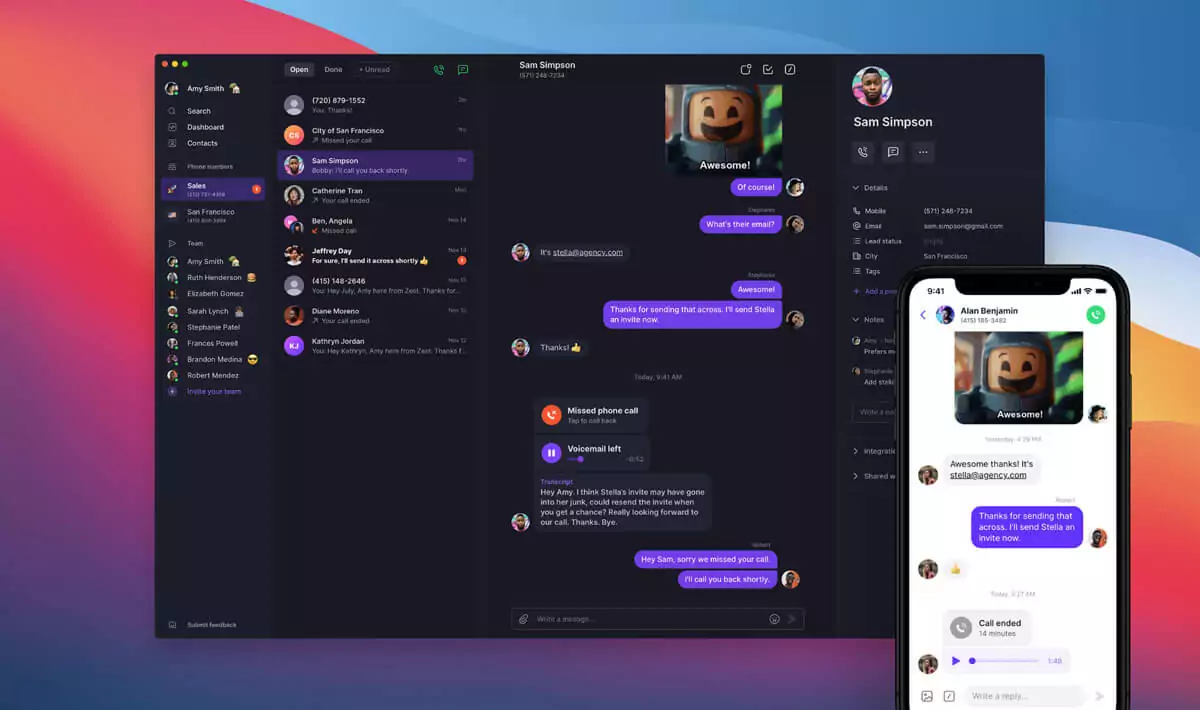
Thousands of small businesses rely on OpenPhone to build relationships with their customers effortlessly. OpenPhone is the #1 rated business phone platform on G2 and has more than 1,000+ 5-star reviews on the App Store.
With OpenPhone, you get unlimited calling to the US and Canada. Along with free SMS and MMS messages to these countries, your team can also easily engage with customers and each other with scheduled text messages, auto-replies, and snippets for a seamless experience.
Unlike Aircall, OpenPhone doesn’t require a minimum number of plan users. Get as many numbers as your team needs to support different departments or specific teammates. Each user on your plan includes one free US, Canadian, or North American toll-free number.
And as your team grows, OpenPhone can easily scale with you as plans start at just $15 per user per month. Any additional numbers that exceed your team’s total users are $5 per number per month. Not only is it simple to add new users, but once you do, your team can share numbers and use internal threads to collaborate behind the scenes.
You can see for yourself how easy OpenPhone is to use with a free, seven-day trial.
Key features of OpenPhone
- Local (US and Canadian phone numbers) and toll-free number options
- Shared phone numbers
- SMS and MMS support
- Auto-attendant and call routing options
- Voicemail to text transcriptions
- Automatic call recording
- Office hour settings
- iOS and Android mobile apps
- Web-based app for all browsers
- Desktop apps for Mac + Windows
- Zapier, HubSpot, Salesforce, Slack, and email integrations
OpenPhone pricing
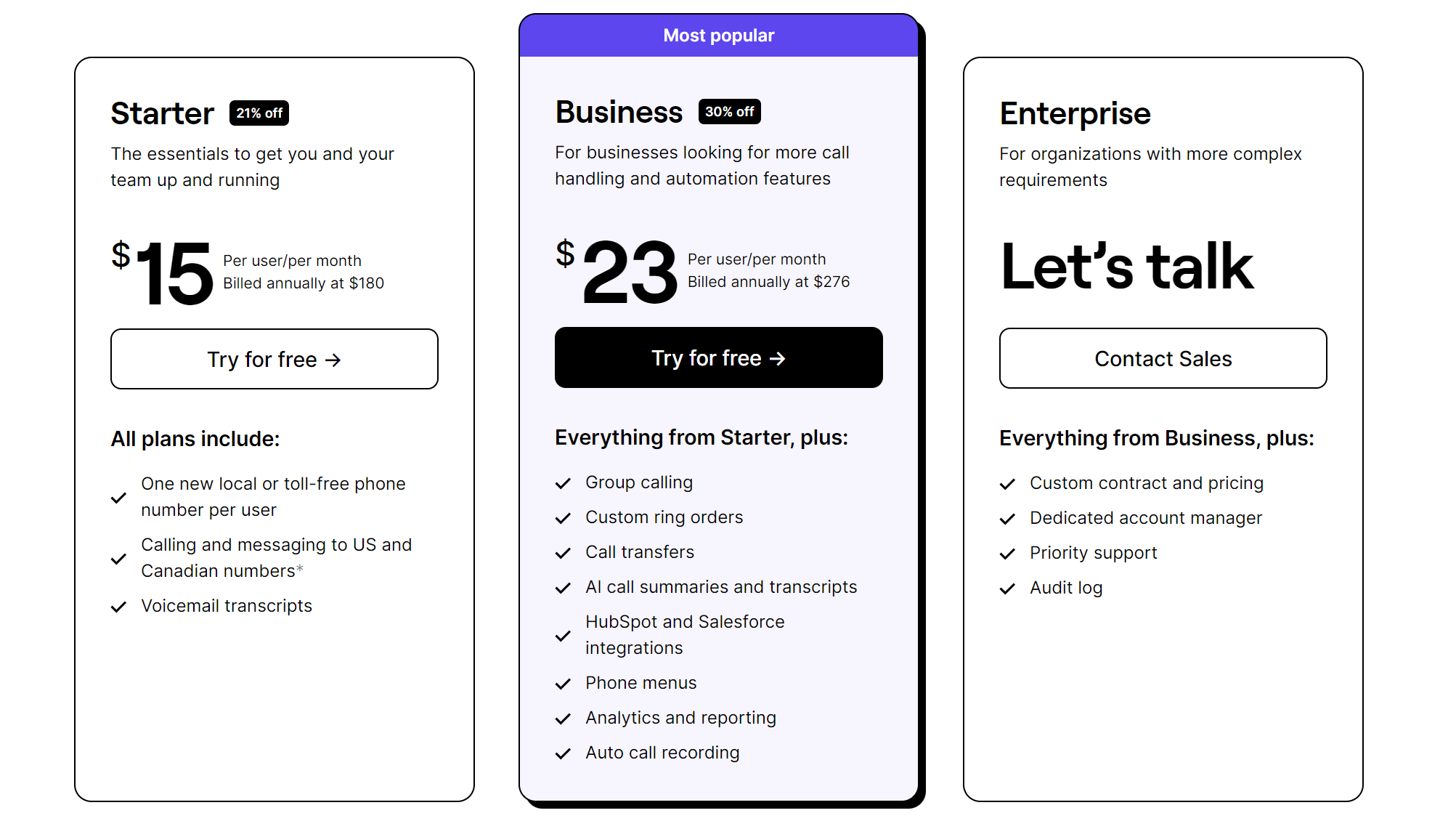
The OpenPhone pricing plans give your team the flexibility to scale as your business grows:
Starter
- Starting at $15 per user per month
- Includes the option to share a number with up to 10 teammates, voicemail transcriptions, scheduled texts, and more
Business
- Starting at $23 per user per month
- Unlocks call transfer, logs and analytics, HubSpot CRM integration, the ability to share your phone number with as many teammates as you need, and more
Enterprise
- Custom pricing for a custom plan
- Unlocks a dedicated account manager to tailor a plan to your team’s needs
How to switch and port your number from Aircall
Want to port your number from Aircall to OpenPhone so you can keep the same phone number? Here’s how easy it is:
- Create an OpenPhone account.
- Select a new number you can use temporarily to confirm that OpenPhone is a great fit during your free, seven-day trial.
- Submit a request to port your number in the OpenPhone app. That’s it! We’ll take care of the rest.
2. RingCentral: The best platform offering desk phone rentals
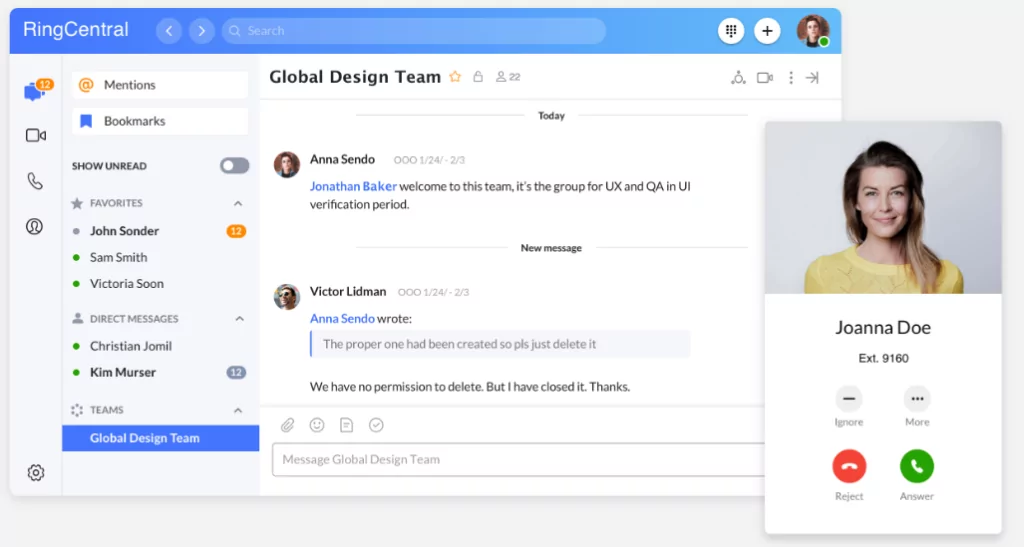
RingCentral is designed for enterprise users and contact centers. Although it offers a spectrum of features, it comes with a higher price tag than other alternatives, such as OpenPhone. As a result, businesses with small support teams will likely find the costs and features of RingCentral overwhelming and costly.
It’s worth noting RingCentral charges you for each text message you send, which can eat up your budget quickly. RingCentral also separates calls and texts into different folders, making it more difficult to piece together and follow up on conversations. This might throw a wrench in your team’s productivity.
While RingCentral offers features like voicemail to text, team document sharing, and toll-free numbers, consider whether the value is worth the cost. RingCentral’s base plan is pretty bare-bones compared to its competitors. For the most critical features like call recordings and integrations, growing teams would have to upgrade fairly often.
Key features of RingCentral
- Free calls and texts in the US and Canada (SMS only)
- Local or toll-free phone numbers
- 200+ users on higher-tier plans
- Android and iOS Mobile app
- Voicemail transcriptions
- Document file sharing
- Team messaging
- Business texting
- Call recordings
- IVR
RingCentral pricing

RingCentral users can choose from three major tiers:
Essentials
- $20 per user/month
- Includes messaging and phone services
Standard
- $25 per user/month
- Unlocks texting, calling, and on-demand call recording
Premium
- $35 per user/month
- Access messages, phone calls, videos, automatic call recording, and an open API
3. Dialpad: The best option with AI-based agent training
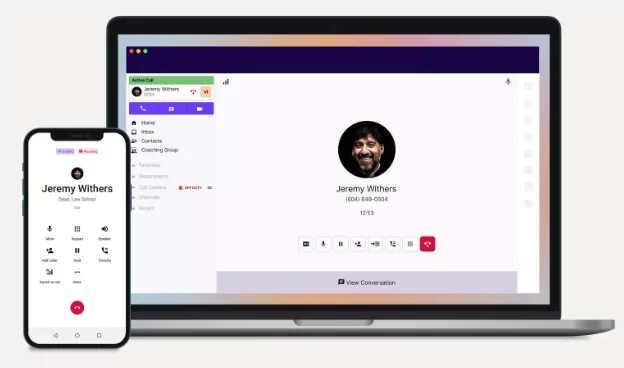
Dialpad is great for big businesses but not so much for small teams.
Their focus is on serving larger enterprises that want their call center agents to receive AI-based coaching. Dialpad doesn’t provide the tailored solutions and affordability that smaller businesses seek.
If you need to tag teammates or assign conversations, Dialpad also won’t be a good fit for you. Beyond call recording, video calling, and speed coaching via AI, Dialpad falls short without an upgrade.
Dialpad also limits you to one number per account on their base plan. Additional numbers and other important features like international texts and auto-replies cost extra. For many growing teams, paying extra for these must-have features is a dealbreaker.
Key features of Dialpad
- Analytics
- Call recording
- Auto-attendant (IVR)
- Relatively low base plan
- Call and voicemail transcriptions
- Provides AI solutions that can benefit call centers
- Integrations with Google Workspace (formerly G Suite) and Office 365
- Speed coaching, which tells you if you’re speaking too fast or too slow
- Offers unlimited calling and texting to US and Canada with any plan (if you’re based in either country)
Dialpad pricing

Dialpad offers three base plan options:
Standard
- $15 per user per month
- Includes unlimited calls, SMS and MMS support, and unlimited video meetings
Pro
- $25 per user per month
- Access local numbers in 70+ countries, up to 25 ring groups, CRM integrations, and international SMS (three user seat minimum)
Enterprise
- Custom monthly price
- Unlock guaranteed uptime, unlimited ring groups, and a dedicated account manager (100 user seat minimum)
Keep in mind Dialpad charges extra for porting in more than one existing phone number.
4. CloudTalk: The best Aircall alternative for outbound sales teams
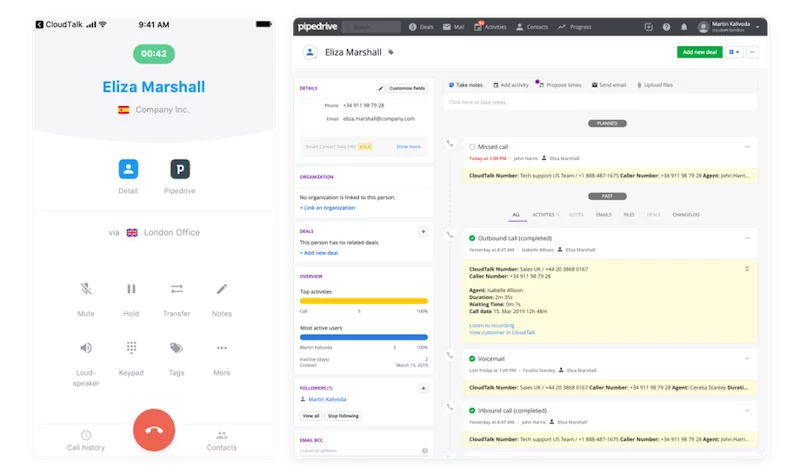
CloudTalk’s cloud-based call center software includes a power dialer that automatically dials number after number. It’s ideal for teams that rely on cold calling because they can focus more on closing sales and less on checking numbers and dialing on repeat.
CloudTalk’s cloud phone system has other standout features that enhance unified communications for other businesses:
- CRM integration
- Call flow designers
- Interactive voice response
Note that many of CloudTalk’s features, like business SMS, require upgrades or add-ons, adding to their already steep rates. While inbound and intercompany calls are unlimited, outbound calls are priced per minute, which impacts the overall cost.
It’s worth considering that several other VoIP providers offer unlimited inbound and outbound calls, offering a better value for your investment compared to CloudTalk.
Key features of CloudTalk
- Click to call
- Access to 160+ countries
- Unlimited call queuing
- Mobile app support
- Call monitoring
- Call recording
CloudTalk pricing

After a 14-day free trial, CloudTalk customers can choose from one of four plans:
Starter
- $25 per user per month
- Includes click-to-call, call distribution, and international number selection
Essential
- $30 per user per month
- Access text messages, analytics, and unlimited call recording storage
Expert
- $50 per user per month
- Unlocks Salesforce integration, speech-to-text, and call monitoring
Custom
- Contact for pricing
- Access to custom reports and flat-fee outbound calls
5. Google Voice: The top solution for teams that run everything on Google apps

When many businesses think of a virtual number, they think first of Google Voice. For a company whose name is so recognizable that it’s used as a verb, Google’s Voice communication platform has limitations.
First, you’ll need Google Voice for Google Workspace ($6 per user per month minimum) If you want to use Google Voice for business. And that might not fly if you’re a small business looking for a cost-effective option.
Google Voice does offer texting capabilities to US customers with limited MMS support, unlimited calls to the US, and mobile and web apps.
However, it falls short when it comes to integrations and flexibility. Google Voice focuses on integrating with other Google apps within the Google Workspace ecosystem instead of other third-party tools.
Many users don’t realize how limited Google Voice actually is until they subscribe. Even at the highest payment tier, you can’t access multiple numbers or third-party integrations outside of other Google apps. That’s a big hurdle for most businesses.
Key features of Google Voice
- Call routing
- Custom greetings
- Voicemail transcription
- Integration with G Suite
- Multi-level auto attendants and ring groups
Google Voice for Google Workspace pricing

Although a personal number is free, businesses pay a minimum of $6 per user per month for a Google Workspace plan along with their business number. Here’s a look at the plan options for Google Voice for Google Workspace:

Starter
- $10 per user per month
- Access for up to 10 team members
Standard
- $20 per user per month
- Access to ring groups, multi-level auto attendants, and on-demand call recording options
Premier
- $30 per user per month
- Unlock unlimited call recordings, advanced reporting, and unlimited international locations
6. Nextiva: The best option for unlimited video calls
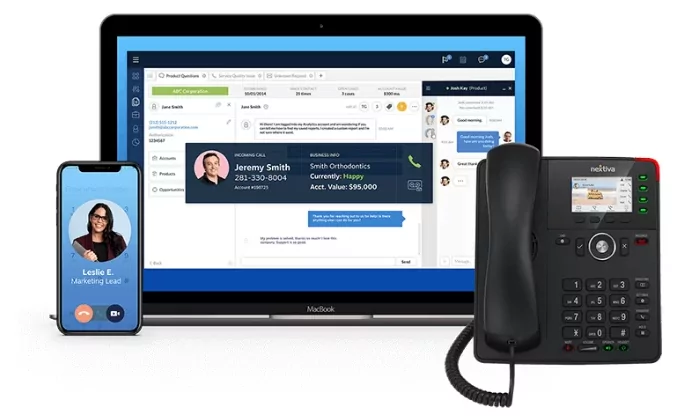
Do you have 100+ team members?
- If yes: Nextiva is a worthy Aircall competitor for larger and more established businesses.
- If no: You might end up paying more for fewer features than other Aircall competitors.
However, Nextiva’s pricing isn’t necessarily prohibitive to younger startups — though it will cost you more, as you’ll see in the pricing section below. Even at the most basic plan, users get:
- Unlimited voice and video calls
- Mobile and desktop applications
- Outlook and Google Contacts integration
The greatest strength of the Nextiva platform lies in its wide range of features. Customers can access VoIP calls and video services at the entry-level plan.
Nextiva may leave you hanging since it doesn’t offer SMS and MMS messaging on its base plan — not the best way to keep those conversations flowing. Also, you’ll have to spring for an upgrade to unlock call recordings and voicemail transcriptions.
Key features of Nextiva
- Auto-attendant
- Voicemail
- CRM integrations
- Unlimited internet fax
- Toll-free numbers (limited minutes)
- Integrations with Outlook and Google Contacts
- Unlimited voice and video calling in the US and Canada
Nextiva pricing

Unfortunately, Nextiva charges smaller teams more per user than larger companies. Here are the four plans you can choose from, with monthly pricing for 1-4 users listed:
Essential
- $23.95 per user per month
- Includes basic unlimited voice and video calling, voicemail, internet fax, and Outlook and Google integrations
Professional
- $27.95 per user per month
- Unlocks screen sharing, SMS and MMS, unlimited conference calling with 40 participants, and Salesforce/HubSpot integrations
Enterprise
- $37.95 per user per month
- Access call recording, voicemail transcriptions, and unlimited video conferencing recording
7. Grasshopper: The best choice for teams that prefer multi-digit phone extensions
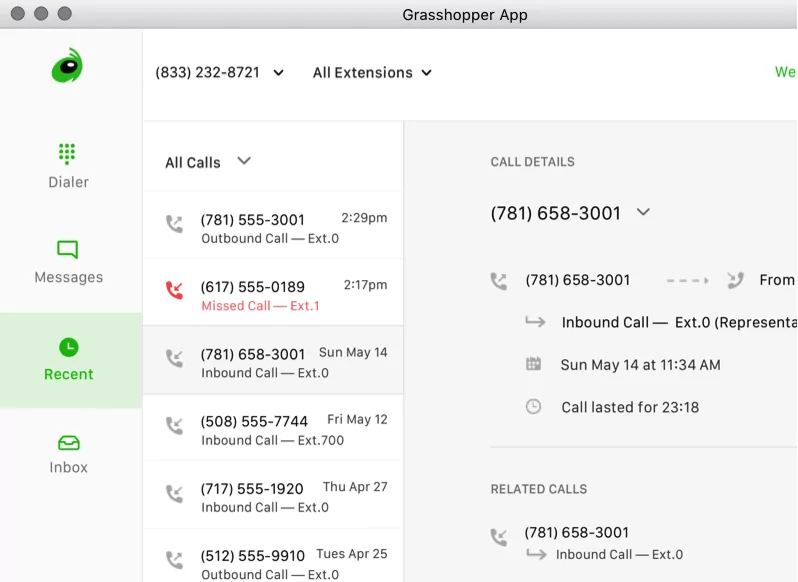
Grasshopper has been hopping around the VoIP world for 20 years, which means it’s often the go-to recommendation from well-meaning acquaintances when business owners ask about phone systems.
While Grasshopper has longevity, it’s not the right fit for growing businesses. Its lack of straightforward pricing and scalable features make it a less-than-ideal choice.
Grasshopper might be more affordable than some Aircall competitors, but let’s address the roadblocks you’ll encounter with Grasshopper.
Forget about texting internationally — it’s not an option. Plus, before making international calls, be prepared to pay a $500 deposit. Voicemails expire after 30 days, and auto-reply texts are limited to first-time callers.
Despite being one of the oldest VoIP solutions, Grasshopper’s outdated user experience and limitations on integrations and shared phone numbers for internal teams might stunt your business growth. There are better options if you’re seeking a modern and adaptable VoIP solution.
Key features of Grasshopper
- Local US, Canadian, or toll-free phone numbers
- Business texting support (MMS not available for toll-free numbers)
- Unlimited calling in the US and Canada
- Call forwarding
- Custom greetings
- 24/7 customer support
- Voicemail transcriptions
- Virtual fax
- Call reporting
- Incoming call control
- Simultaneous call handling
- Free porting for your existing number
Grasshopper pricing

Grasshopper’s plans are tiered based on the number of phone numbers and extensions included. Fair warning: The monthly costs are expensive — especially for a service not built to scale with your business.
Solo
- $28 per month
- Includes one phone number and three extensions
Partner
- $46 per month
- Includes three phone numbers and six extensions
Small Business
- $80 per month
- Includes five phone numbers and unlimited extensions
8. Vonage: The best solution with an API
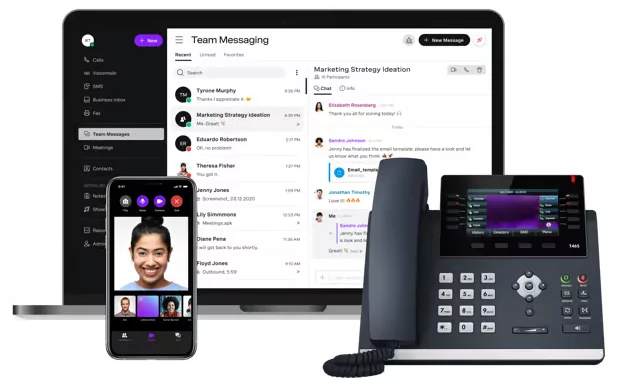
Vonage is a unified communications platform that brings your voice calls, video calls, and messaging all onto one cell phone or desktop app — with a reliable uptime of 99.999%. However, hidden fees and pricey plans can overshadow their offered features. For example, you can get lower rates, but to get them, you’ll need more than 20 users on your plan. There are also extra costs for features like call recording ($49.99 per month) and call groups ($4.99 per month), so your team can receive calls simultaneously.
While Vonage provides unlimited team messaging, CRM integrations, and cross-device accessibility, their pricing can be a dealbreaker. Instead, consider Aircall alternatives that offer simplicity without busting your budget.
Key features of Vonage
- Unlimited team chat
- Internal team messaging
- Mobile and desktop apps
- Texts in the US and Canada
- Free calling in the US, Canada, and Mexico
- 20 third-party integrations (like Clio or the G-Suite)
- SMS in the US (API required to send MMS messages)
Vonage pricing

Vonage can be confusing with hidden fees and extra costs for features like call recording and auto-attendant. Lower rates only apply to teams with 20+ people.
Check out Vonage’s range of plans with pricing below based on teams of four users or fewer:
Mobile
- $19.99 per line per month
- Includes 24/7 customer support
Premium
- $29.99 per line per month
- Unlock auto-attendant and CRM integrations (HubSpot, Microsoft Dynamics, Salesforce, and the like)
Advanced
- $39.99 per line per month
- Access call recording (15 hours max) and voicemail transcriptions
- Keep in mind that Vonage requires a one-year minimum contract and doesn’t offer a free trial
9. Line2: The most no-frills VoIP business phone solution
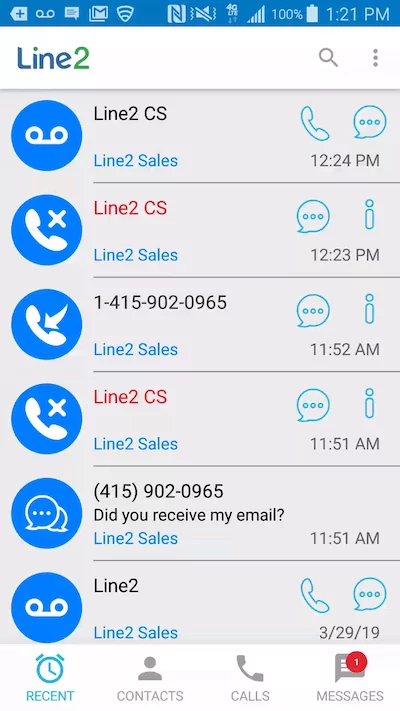
Line2 provides VoIP numbers for businesses, but its features like caller ID, merged calling, and call forwarding are relatively basic. VoIP numbers from Line2 bridge the gap between traditional business lines and virtual solutions. Line2 also comes with calls and texts in the US and Canada.
Otherwise, many features offered by Line2 aren’t much better than a standard business phone.
If you base most business purchases on user reviews, you might want to opt for another Aircall alternative. Many users report poor performance and bugs, which might be frustrating for business owners that want a more reliable phone solution.
Key features of Line2
- Caller ID
- Voicemail
- Merged calling (up to 99 callers)
- Phone number porting (takes up to five weeks)
- VoIP call forwarding service
Line2 pricing

One of Line2’s best features is its no-frills pricing. You have two options: pay monthly, or pay annually and get a small discount.
Monthly
- $15.99 per user per month
Annual
- $13.75 per user per month billed annually
10. Ooma: The best option for large retail stores
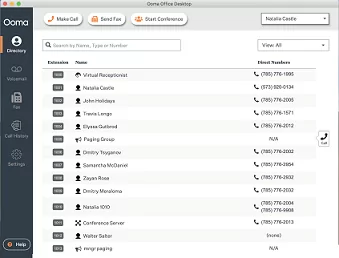
Unlike other VoIPs, Ooma was specifically designed with hardware and software for growing enterprises. However, Ooma stands out for its ability to support in-office teams including:
- 911 service for emergency phone calls
- Intercom systems for receptionists
- The option to have a dial-in number for conference calls
Teams working from a retail store may also find their paging feature handy, so you can reach people in large spaces.
Although Ooma’s business phone system is pretty barebones, features like free toll-free numbers, mobile apps, and virtual extensions aren’t too shabby.
If you expect a smooth migration, transitioning preexisting workflows to Ooma’s phone solutions might be challenging without analytics or third-party integrations. It’s also worth noting some key functionalities are only available with the higher-tier plan.
To unlock Ooma’s full potential — like call recordings or accessing Ooma via its desktop app — you need to upgrade. The option to text is also only available on their higher-tier plans.
Key features of Ooma
- Ring groups
- Music on hold
- Digital fax
- Call transferring
- Voicemail transcriptions (requires upgrade)
- Ring groups
- Call recording
- Call forwarding
- Video conferencing
- Voicemail transcriptions
Ooma pricing

Ooma’s plans start with the most basic communications necessities to a pricey plan with CRM integration, analytics, and text messaging.
Check out the three tiers:
Essentials
- Starting at $19.95 per user per month
- Standard phone features along with a virtual receptionist, ring groups, and email audio attachments
Pro
- Starting at $24.95 per user per month
- Adds text messaging, videoconferencing, Ooma’s desktop app, call recording, and analytics
Pro Plus
- Starting at $29.95 per user per month
- Adds Salesforce integration, hot desking, call queuing, and advanced call management
11. Phone.com: The best choice for HIPAA compliance
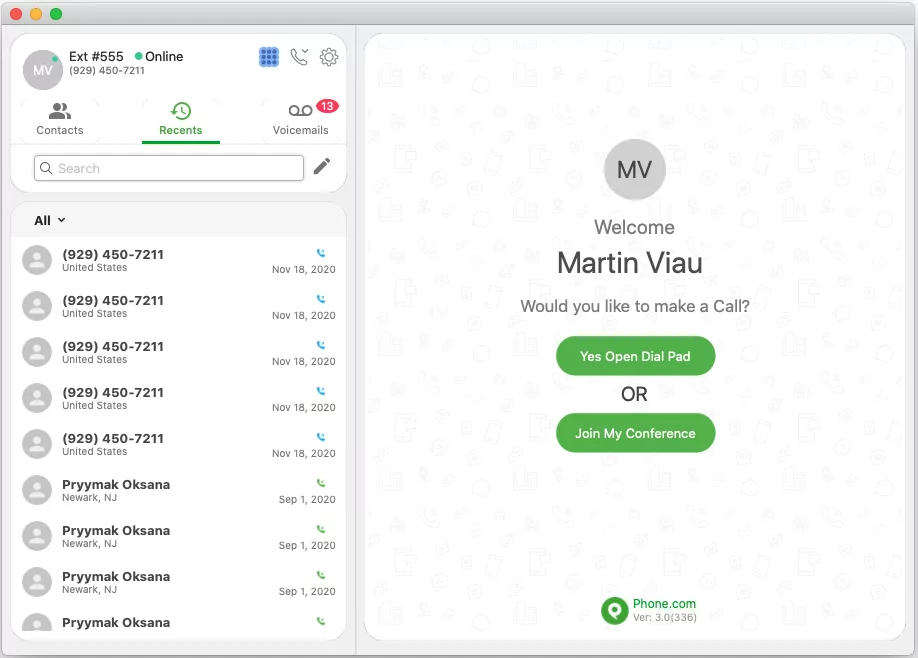
At first glance, Phone.com seems like a steal, especially for healthcare companies seeking HIPAA compliance. However, not all that glitters is gold. Before you dive in headfirst, take a moment to consider the fine print.
With a limited allowance of 500 total minutes and 1,000 text segments (which, mind you, get chopped into smaller bits if they exceed 160 characters), you might find the overage fees can sneak up on you faster than a speeding text message. Suddenly, that seemingly affordable plan loses its charm.
Before choosing a business phone system, consider your potential usage — those limited minutes and text segments might not cut it for long. Other Aircall competitors won’t leave you counting every character.
Key features of Phone.com
- Voicemail to email
- Video conferencing
- Conference calling
- Call routing functions
Phone.com pricing

With Phone.com’s plans, you’ll pay a bit more for HIPAA compliance. You can also mix and match users onto different plans. Choose from any of the following pricing plans:
Basic Users
- Starting at $12.74 per user per month
- Access to 500 pooled call minutes and 1000 pooled text segments with 1 phone number per account
Plus Users
- Starting at $18.69 per user per month
- Unlock unlimited minutes, one phone number per user, HIPAA-compliant video conferencing, and conversational text messaging
Pro Users
- Starting at $27.19 per user per month
- Unlock all of the above and add call recording, analytics, CRM integrations, and enhanced video conferencing for 100 participants
How we ranked the top Aircall alternatives
In the quest to find the top alternatives to Aircall, our experts immersed themselves in top review sites like G2 and TrustRadius. Then, they tested multiple VoIP solutions against the following five key criteria to handpick the best contenders:
- Value for money: When looking for a business phone system, consider upfront and long-term value, and watch out for activation costs and hidden fees.
- Reliability: Few things are more deflating than a dropped call on your end (especially when it’s not your internet connection). With that in mind, you can gauge the call quality during a free trial from providers you shortlist.
- Third-party integrations: Does a specific VoIP phone system work with popular tools you already use? There are top business phone solutions that work seamlessly with your current tools and help streamline your workflow using automations.
- Ease of use: The top VoIP phone systems mentioned make communication easier. A user-friendly interface with little to no learning curve helps your team quickly get comfortable with the new tool.
- Customer support: When you’re in a pickle, you should be able to get help from customer support quickly or easily navigate their Help Center to get your question answered.
OpenPhone: The best Aircall alternative
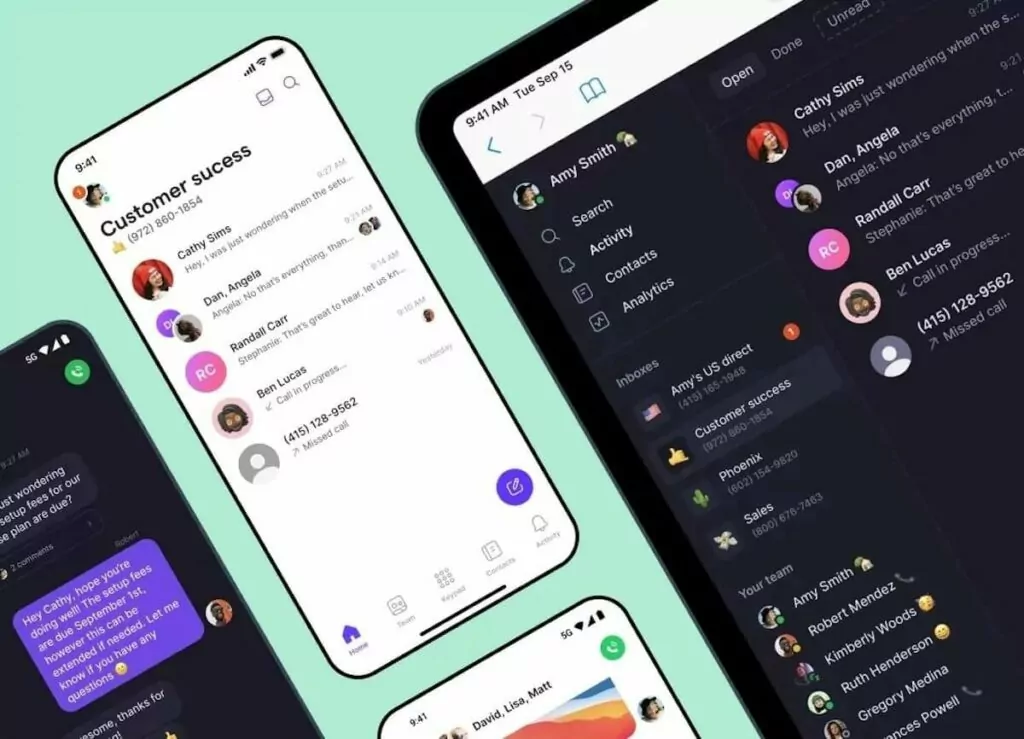
Open to a top-notch Aircall alternative?
OpenPhone is the modern business phone system for small businesses, startups, and solopreneurs.
Your team can use talk and text to support customers, team members, and clients using nothing but WiFi and any devices you already use. Accessing your business phone number from anywhere with IOS, Android, desktop, and browser-based apps is easy.
With OpenPhone, you can easily work together from an easy-to-navigate app to build relationships with your customers. Your team can also save time texting and still cultivate trust with your contacts using features like:
- Auto-replies
- Snippets
- Scheduled messages
Plus, OpenPhone offers competitive pricing starting at just $15 per month per user, making it a cost-effective solution that won’t drain your budget.
Ready to see how it can help you connect with your customers? Start your free trial of OpenPhone today.
